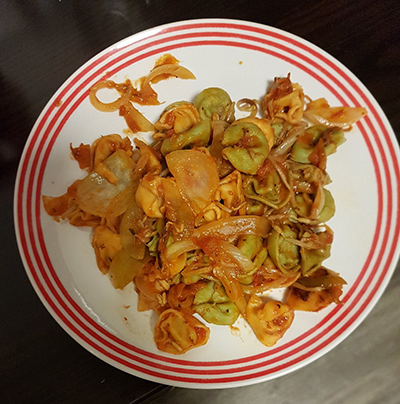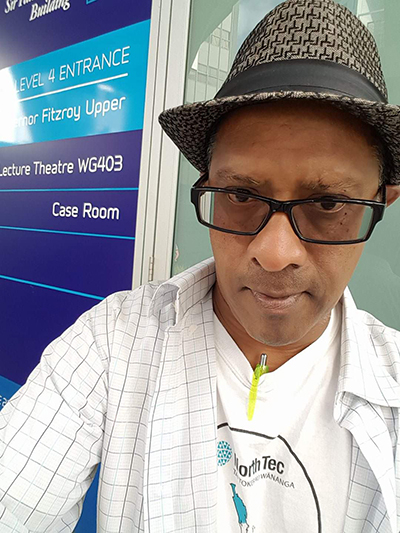
Sri Krishnamurthi reflects in this special report on what life is really like trying to live and cope with the effects of a stroke for three years.
Those were the most horrifying days of my life. It’s only now that I find the courage to write about my trials and tribulations.
November 2, 2016, travelling from Chennai to Bangalore, India, in the evening, that was when I suffered a stroke. There aren’t any happy memories of that day and subsequent days, weeks and months.
I have never owned the stroke, by calling it MY stroke … and never will. It was just an unfortunate set of circumstances that led to it. Like being a type 2 diabetic, having high blood pressure – not really understanding that your blood pressure (BP) should be 120 systolic/over 80 diastolic.
I would urge everyone, young and old, to get your BP checked at your nearest pharmacy.
At first my brother and mum thought I had a “hypo” (low on sugar) being a diabetic and soon they realised it wasn’t!
Many have since asked me to describe what it felt like to have a stroke. For me, it was terrifying – I couldn’t speak without slurring, the arm gave way, the right side of my face fell away, all of this followed a distinct humming sound in my ear before I felt my body tighten in a vice-like cramp. (The experience isn’t the same for all us)
– Partner –
Not knowing your own mind is very confusing … they say we lose 2 million brain cells or neurons every minute … but, what I know is that when the brain has a constricted blood flow to it, every part of you dies.
Ischemic stroke
I had an Ischemic stroke, that occurs when the arteries to your brain become narrowed or blocked, causing severely reduced blood flow (ischemia). The most common ischemic strokes include: Thrombotic stroke. A thrombotic stroke occurs when a blood clot (thrombus) forms in one of the arteries that supply blood to your brain. (Definition thanks to Google). It affects the right side of your body.

There is no such thing as a “mild” stroke, a stroke is a stoke – the degree of debilitation is devastating for sufferers of a stroke. There are no words to describe it.
The worst aspect of the condition is your brain doesn’t know whether you are Arthur or Martha, which day of the week it is and simple actions like counting backwards from 10 cannot be comprehended.
It is feeling of complete disorientation and helplessness. You are fatigued very quickly, your emotions are very raw and surface quickly, tears aren’t very far away … and the frustration of being half the man you once were wells up into utter depression.

Then there is the loneliness that creeps in on you, barring a handful of your very best friends … the rest choose to become acquaintances on social media … they have lives and families that MUST and SHOULD come first.
I must pay tribute to my mum, brothers, sister and my dear brother-in-law for doing all they could to ease me back into the world of the living.
And, give credit where it belongs, I’ve been married twice – both times unsuccessfully – and my partner for over 12 years no longer wants anything to do with me. But there is my platonic flatmate, a beautiful soul and a friend for more than 20 years who took me out of “Homestay”- a hostel in Manukau that I moved into within a month of returning from India and I am eternally grateful to her for being there.
Homestay cooking
Homestay is where I cooked my first meal – pasta, having had cooking as part of my rehabilitation.

The first dish that I cooked to prove I could live and operate independently was a dish of prawns at my sister’s home where I stayed for a month while trying to decipher who I was.
Then there was social welfare, I am grateful to WINZ for being there, but there are many faults in the system. The first time I turned up, without any forms filled. How do you manually fill in forms when your writing hand doesn’t work?…And your case worker looks at you with disdain…There can few more humiliating instances for the disabled.
I was sent away with the forms to fill – and that is one of many failings for the disabled that WINZ can and should help with because, after struggling with them I managed with great difficulty to fill them in anyway. One way that WINZ can help the disabled is to hire people to help you or the uneducated to fill out forms.
I can openly say WINZ workers are the most abused and over-worked public servants and to their credit they never complain and are not given due recognition for the work they do. However, they are as caring and compassionate as the system allows them to be.
A broken body and mind, but not a shattered spirit. From walking with a crutch to the sheer joy of walking unaided to the point of being told off by a very angry woman for using the disabled toilet at a restaurant.
“You’re not disabled,” I recall her shrieking to me. I replied, “doesn’t a stroke count?” She said, in a disbelieving and accusatory tone, “Well, you don’t look it….” Her voice trailed.
Grateful thoughts
I guess I should be grateful for small thoughts like hers to think me able bodied. In a bizarre way, we feel entitled to use the disabled toilets – but not for a tryst, a la All Black Aaron Smith!
My first attempt at HOBBLING.
What was I going to do for a living? The only industry I knew was the media, and I had get my brain working … words that previously flowed in torrents had slowed to a trickle, often those words were there but pulling them out was a near impossibility.
You learn new tricks when you have a stroke – words associated with images, or words through the process of elimination worked for me. And then there was the trusted old Google when you couldn’t be bothered.
You learn to use bungee shoelaces or Velcro shoes because tying shoelaces just won’t happen. The right arm is bung and you are back to typing with two fingers – as I’m doing now. At the same time, technology is your biggest ally.
As is Vibra-Train, a unique training system that is great for circulation and building up wasted muscle structure. It has a studio in Auckland that is free for the disabled, for cerebral palsy (CP) and stroke survivors alike. And the genius behind it all is Lloyd Shaw who has built his own machines.
Then there is social media which gets your brain working as you post up your pictures and little quips following others, or commenting. And curating content can be very cathartic in your rehabilitation. You have to learn how to deal with trolls … or just mean and nasty vindictive people.
‘Done on computers’
I made a very conscious and curious decision to return to university and do a Postgraduate Diploma in Communication Studies at Auckland University of Technology (AUT). I distinctly remember talking to a senior lecturer, Gudrun Frommerhz: “But I can’t take notes because my writing sucks”.
She replied, encouragingly: “You don’t have to write, everything you do is done on computers.”
However, the self doubt creeps in like a nagging negative presence: “Can I manage to do this?”
Apprehensive at AUT, not knowing whether I could handle studies, April 2017

In July 2017, I began my two-year sojourn at AUT doing the postgraduate diploma … and so began my journey towards a normal and somewhat full life.
So, when people and acquaintances ask me these days, “how are you doing?” my reply is always: “As good as I can be”.
The two wonderful years at university is another story – for another day.
Sri Krishnamurthi graduated with a Postgraduate Diploma in Communication Studies (Digital Media) in 2019. He has been a special projects writer for the Pacific Media Centre since he joined AUT and is this year the PMC Pacific Media Watch freedom project contributing editor. Before his stroke, he had a career in sports journalism for the NZ Press Association and in communication management roles, and gained an MBA (Massey University). The article was first published on Sri’s personal blog and is republished with permission.
Article by AsiaPacificReport.nz





